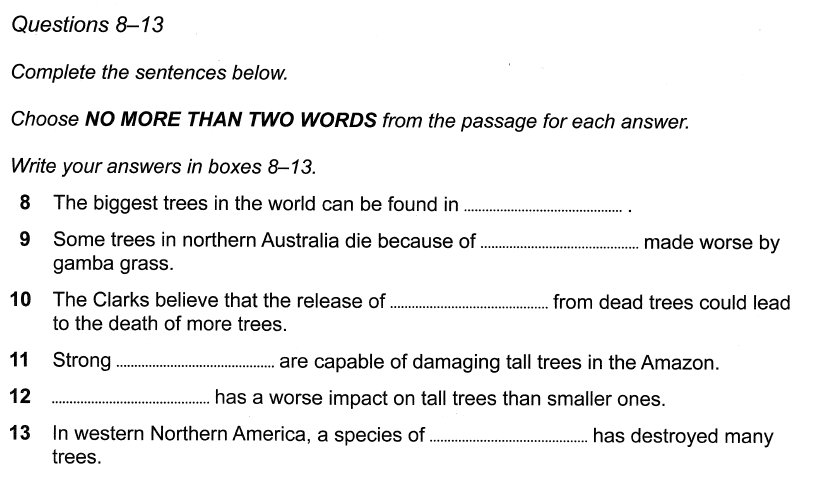Sentence completion questions test your ability to find specific details or information in the passage.
- You must fill in the gaps in the sentences with appropriate words from the passage.
- You will be told the maximum number of words to write.
- You must only write words that are in the passage and make sure you copy the spelling correctly, especially plural words
- You do not need to change the words from the passage.
- The answers are always in serial order of the text.
Click here to learn about all the questions types that have answers in the serial order of the passage.

In sentence completion tasks, the most severe issue with students is that they choose the wrong word/s from the passage and, most of the time, write more words than needed. The latter case is what most students have problems with.
Let’s find solutions to why such mistakes happen on Sentence Completion tasks. Firstly, let’s start with the essential thing to consider and a frequent student error.
I am so curious about one point: I have just finished a reading practice test and there were two answers on sentence completion part I got wrong.
1. the answer was “complex” (I answered “increasingly complex”)
2. the answer was “slowed down porportionately” (I answered “slowed down”)
both of these said “NO MORE THAN THREE WORDS”
this made me confused.”
1. When you do not understand the context of the question and the text
Students make mistakes like the above when they do not understand the text and question’s context.
Let’s look at an example:

Complete the sentences below.
Choose NO MORE THAN TWO WORDS from the passage for each answer.
Q. In western Northern America, a species of………………………….has destroyed many trees.
Think of the answer to the question above.

Complete the sentences below. Choose NO MORE THAN TWO WORDS from the passage for each answer.
Q. In western Northern America, a species of.……….………………..has destroyed many trees.
I think it’s ‘bark beetle.’
Q. In western Northern America, a species of bark beetle has destroyed many trees.
But alas, the answer is beetle only. How in the world? Why ‘bark beetle’ is wrong?
Well, ‘bark’ is a species of beetle, and the question is telling you to find the species/name of a particular animal/bird/insect that destroyed trees. That’s why you’ve got it wrong there, and usually, mistakes like such happen. It’s crucial that we fully understand the question first before we rush to look for an answer.
2. When you do not understand the instruction telling you the number of words you can write
If the question asks you to write TWO WORDS AND/OR A NUMBER, this means your answer maybe-
- One word
- Two words
- One word + a number
- Two words + a number
Most students get confused with how a number is counted if it’s written as a word and as numerical.
REMEMBER, in IELTS Reading & Listening, the answer is counted as a number even if we write it as a word!
e.g., Three hundred boxes { Three hundred = one number and boxes = one word}
If the instruction is ‘write TWO WORDS AND/OR A NUMBER’, and if you write ‘Three hundred blue boxes‘, it’s two words + a number ( Three hundred= 1 number and blue boxes=2 words), this doesn’t exceed the number of words you must write.
No matter how big the figure is – fifty billion, one million twenty thousand, etc., they are always counted as a NUMBER in IELTS!
3. When you do not predict the answers in the gaps, beforehand
I always tell my students to predict answers whenever they see blanks in listening and reading sections. Predicting is an excellent way to find answers quickly. You can always look at the blank and think if a noun, verb, adverb or adjective fits there. If you do not want to go with these grammatical terms, you can just put up your own words in the blank and guess.
E.g., Q. In western Northern America, a species of ……………………. has destroyed many trees.
In this question, you can predict if a noun, verb, or adjective would fit. I certainly don’t think a verb or an adjective goes in the blank, and that helps me quickly locate a noun in the passage.
Or, you can also put up your own words to make a guess, like I would say —a species of butterfly or any bird.
Note: Prediction helps in all gap-filling questions in IELTS.
4. When you do not read the whole sentence after guessing the answer
Most students quickly jump to conclusions after they have found out the answer. It is essential to put the word (you think is an answer) in the blank and read the whole sentence. If you have chosen the wrong word from the passage, the sentence will be grammatically incorrect. That’s why, ‘Put the word in the blank, read the whole sentence’, remember this sentence the next time you do completion tasks.
Bonus Points
- Sometimes, 2-3 connected sentences give answer. So, don’t just rely on one particular sentence.
- You need to read many sentences to understand the gist of the text and get to a particular sentence for answer.
- Information that sentence completion task give are usually understood by reading strings of sentences in the passage before we finally reach the gap part of the question.
- Finding synonym of the words just before and after (if any) the blank really helps to get the accurate answer.
Good Luck!

About the Author
Merina is an experienced English Tutor, Exam Trainer and Head of the IELTS Teaching Department at BeatMockTest. Merina is also a Freelance Examiner and Materials Reviewer for IELTS Resources.
